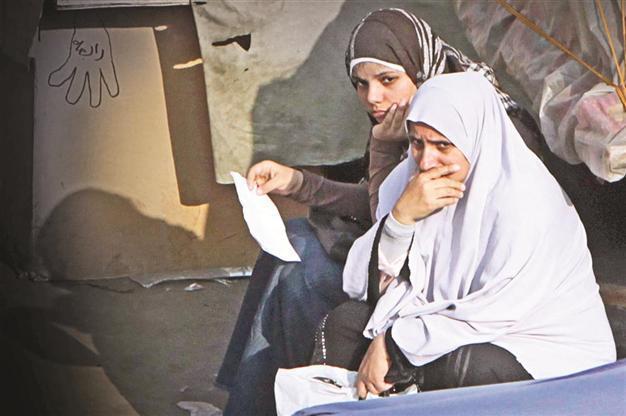Egypt worst Arab state for women, poll shows
LONDON- Reuters

Despite hopes that women would be one of the prime beneficiaries of the Arab Spring, they have instead been some of the biggest losers, as the revolts have brought conflict, instability, displacement and a rise in Islamist groups in many parts of the region, experts said. REUTERS photo
Sexual harassment, high rates of female genital cutting and a surge in violence and Islamist feeling after the Arab Spring uprisings have made Egypt the worst country in the Arab world to be a woman, a poll of gender experts showed yesterday.
Discriminatory laws and a spike in trafficking also contributed to Egypt’s place at the bottom of a ranking of 22 Arab states, the Thomson Reuters Foundation survey found.
Despite hopes that women would be one of the prime beneficiaries of the Arab Spring, they have instead been some of the biggest losers, as the revolts have brought conflict, instability, displacement and a rise in Islamist groups in many parts of the region, experts said.
‘Removing’ Mubarak “We removed the Mubarak from our presidential palace but we still have to remove the Mubarak who lives in our minds and in our bedrooms,” Egyptian columnist Mona Eltahawy said, referring to Egypt’s toppled dictator, Hosni Mubarak.
Iraq ranked second-worst after Egypt, followed by Saudi Arabia, Syria and Yemen. Comoros, where women hold 20 percent of ministerial positions and where wives generally keep land or the home after divorce, came out on top, followed by Oman, Kuwait, Jordan and Qatar.
The poll by Thomson Reuters’ philanthropic arm surveyed 336 gender experts in August and September in 21 Arab League states and Syria, which was a founding member of the Arab League but was suspended in 2011.
Questions were based on provisions of the U.N. Convention to Eliminate All Forms of Discrimination Against Women (CEDAW), which 19 Arab states have signed or ratified.
The poll assessed violence against women, reproductive rights, treatment of women within the family, their integration into society and attitudes towards a woman’s role in politics and the economy. Experts were asked to respond to statements and rate the importance of factors affecting women’s rights across the six categories. Their responses were converted into scores, which were averaged to create a ranking.
Egypt scored badly in almost all categories. Women played a central role in the country’s revolution but activists say the rising influence of Islamists, culminating in the election of Muslim Brotherhood leader Mohamed Morsi as president, was a major setback for women’s rights.
Morsi was toppled in a military takeover in July after mass protests against his rule, but hopes for greater freedoms have been tempered by the daily dangers facing women on the street, experts said.
A U.N. report on women in April said 99.3 percent of women and girls are subjected to sexual harassment in Egypt, which some analysts say reflects a general rise in violence in Egyptian society over the past half-decade. Human Rights Watch reported that 91 women were raped or sexually assaulted in public in Tahrir Square in June as anti-Morsi protests heated up. Respondents also cited high rates of forced marriage and trafficking. Female genital mutilation is endemic in Egypt, where 91 percent of women and girls - 27.2 million in all - are subjected to cutting, according to UNICEF.
In Iraq, women’s freedoms have regressed since the U.S.-led 2003 invasion and overthrow of Saddam Hussein, the poll showed. In Saudi Arabia, ranked third worst, experts noted some advances.
The kingdom remains the only country that bans female drivers but cautious reforms pushed by King Abdullah have given women more employment opportunities and a greater public voice.
Comoros, an archipelago in the Indian Ocean, is leading the way on women’s rights in the Arab world, the poll found. Women are not under pressure to give birth to boys over girls. Contraception is widely accepted and supported by state-run education campaigns, while property is usually awarded to women after divorce or separation, experts said.
